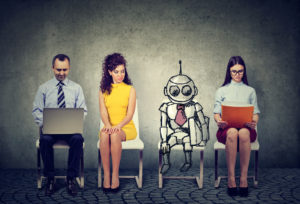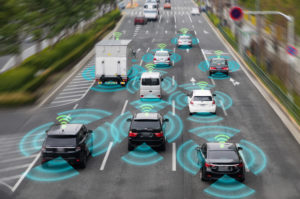
We Need to Prepare for Tomorrow’s AI Job Impacts Now

(pathdoc/Shutterstock)
There is a fair bit of uncertainty over the impacts that AI will have on people and their jobs. Multiple future pathways beckon, different eventualities exist, and humans embody the ultimate wildcard: The freedom to choose. But in the assessment of AI expert Neil Sahota, significant changes are already baked into the equation, and there is little time to lose.
Sahota has lots of eggs in lots of baskets. As the Chief Innovation Officer and a lecturer at the University of California Irvine School of Law, Sahota studies the intersection of AI and legal matters. He is an advisor to the United Nations, where he counsels the organization on its “AI for good” initiatives. He also carries the title of master inventor at IBM, where he led business development at the Watson Group.
In Sahota’s view, we’ve just begun the scrape the surface of the predictive power of AI, which will unleash major changes in how we live and what we do. As a species, we have the ability to adapt, Sahota says, and we should be using our time today to prepare for the changes that are coming. Unfortunately, in many respects, we’re falling behind the predictive eight ball.
“The rate of change is getting faster,” Sahota tells Datanami in a recent interview. “That’s the big challenge that we have. I think people don’t realize the acceleration in the rate of change that’s actually going to occur.”
Take self-driving cars, for instance. It’s tough to come up with a more visible manifestation of AI than vehicles that can pilot themselves. There have been self-driving busses and taxis on the streets of Singapore for several years, Sahota says. Mazda recently reached the level-5 self-driving milestone with its Chinese testing program, he adds. It’s just a matter of time before they appear on American roads.
“You talk to the average person, and they think, well, that’s like 15 to 20 years away,” Sahota says. “And it’s not. It’s probably like six years [away]. But because they think it’s so far away, they think they have plenty of time to adapt and get ready. And it’s like, you don’t. And unfortunately, you’re wasting valuable time at the moment.”

The real question isn’t when we’ll have self-driving cars on American roads, Sahota says –it’s when will human drivers be banned (metamorworks/Shutterstock)
The UN estimates that self-driving cars will eliminate about 60 million jobs around the world, according to Sahota. It’s clear that when cars and trucks can drive themselves, drivers are no longer needed. But the impacts don’t stop there.
When cars drive themselves, we’ll likely need fewer of them. That impacts the automotive manufacturing and its supply chain, as well as the repair shops. Many restaurants and motels that cater to truckers along the interstate freeway system will suffer declines in sales.
Among the 60 million lost jobs, a certain percentage of folks will likely leave the job market forever. “If you’re a 60-year-old taxi driver, it’s really hard to actually go back to school for a couple of years,” Sahota says. “We know that some people, unfortunately, will get left behind.”
We have a window of opportunity now to help people adapt to the changes that AI will bring to the world–and not just for truck and taxi drivers. Across the spectrum of work, AI will likely bring a change to how things get done.
“A lot of the grunt work, the admin paper work is going to go away. The question is how can we get people ready for this?” Sahota says. “A lot of people are worried that a machine will take your job. But there’s also the flip side, where machines are also going to make us better at what we do.”
AI is just a tool, like any other technology, Sahota says. But it’s capacity to learn higher order patterns makes it useful not only in the administrative realm, but in the professional space too.
For example, Walmart saves millions of dollars every year by running complaints through an AI system trained on law, Sahota says. In the medical space, having an AI make the initial screening on symptoms could free up nurses and doctors to see more patients, which would be a net gain for humanity.
“You take that off their plate, and now you free up more time for time to work with the patients that have more serious illnesses or more rare illnesses,” Sahota says. “That should be the ultimate goal, so they’re doing more value-added work.”
Jobs that require imagination and creativity continue to have a strong human component, because AI cannot recreate human creativity and imagination (at least not yet). Across industries, humans will be needed to not only create AI solutions, but to train and manage them.
Critical thinking skills will also be in high demand. “We don’t do a great job of teaching people how to think, and that’s going to become the paramount skill,” Sahota says.
Today’s children are tomorrow’s workforce, and there is a lot that we can do to prepare them for the new AI-infused jobs they will be starting in the next decade. Sahota applauded the work of the Anaheim Unified School District in preparing students for AI.
“They started programs in cybersecurity and artificial intelligence. They’ve been very active in forming partnerships with companies like Google, to get some of the tools in the classroom, and providing training for the teachers,” he says. “They’re weaving this into the regular curriculum, so it’s not that we’re pushing something else out. It’s just we’re getting ready for the new skill sets, the new job demands, as well as expose them to the tools they’re going to be expected to use in the near future.”
There will be jobs for data scientists and software engineers, of course. But even outside of those tech jobs, workers will need to have a greater understanding of how AI works just to do their jobs.
Sahota estimates that, in 10 years, 90% of everything we do or use will probably have some AI component to it. In light of that change, and considering the innate human ability to create, it seems likely that some number of jobs that we can’t even fathom at the moment will essentially be created out of thin air.
“You know new jobs will get created. They’re being incubated today,” Sahota says. “Go back 10 years. There were no Uber or Lyft drivers. There wasn’t that much social media marketing yet in place. There will be a shift in where the jobs will go, and we know part of that shift will be more complex, value-add type of work.”
Humans possess an abundance of flexibility and ability to adapt to changing circumstances. We have lived through multiple ice ages, dealt with rising and falling sea levels, and survived countless floods and droughts. As AI tech matures, humans will need to be flexible to adapt to another bout of change.
“We know the jobs of tomorrow are going to be different. We’ve got to get the students ready today,” he says. “We have a small runway to make this work. Let’s take advantage of it. And that kind of mindset is slow to come, because we’re not used to fast change. And whether we like it or not, change is happening faster and faster.”
Related Items:
Rethinking Education in an AI-First World
Why Human Integration Is Critical to the Future of AI




























